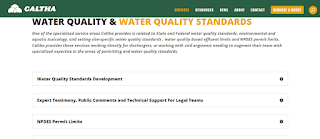Under the Clean Water Act, the "
sheen rule" provides the framework for determining whether an oil spill should be reported to the federal government. Federal regulation requires the person in charge of a facility or vessel responsible for discharging oil that may be "harmful to the public health or welfare" to report the spill.
The regulation establishes the criteria for determining whether an oil spill may be harmful to public health or welfare, thereby triggering the reporting requirements:
- · Discharges that cause a sheen or discoloration on the surface of a body of water;
- · Discharges that violate applicable water quality standards; and
- · Discharges that cause a sludge or emulsion to be deposited beneath the surface of the water or on adjoining shorelines.
These reporting criteria are independent of local or State spill reporting requirements. Therefore, spills might be reportable even if State spill reporting thresholds are not exceeded.

Hazardous Chemical Spill to Sewer Outside Manufacturing Plant
Because the Oil Pollution Act of 1990, which amended the Clean Water Act, broadly defines the term "oil," the sheen rule applies to both petroleum and non-petroleum oils and fats (e.g., vegetable oil, milk). The regulation also provides several exemptions from the notification requirements.
Need more information of federal, State or local spill reporting requirements? Contact Caltha at
info@calthacompany.com
Caltha LLP | Your EH&S Compliance,
Auditing and EMS/SMS Partner


